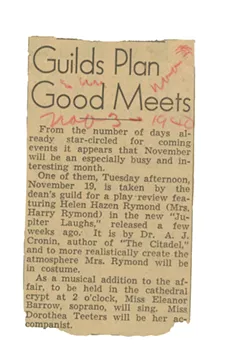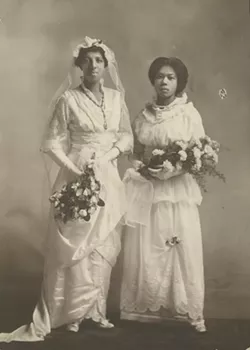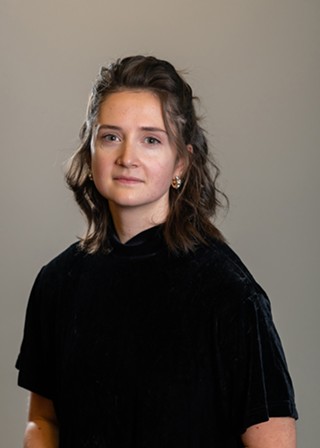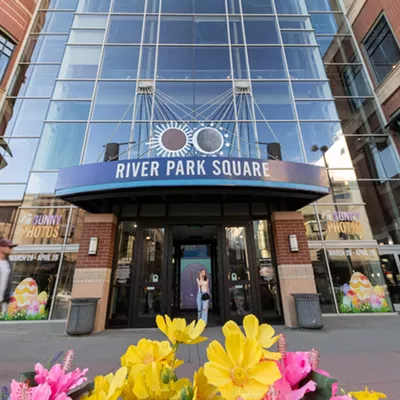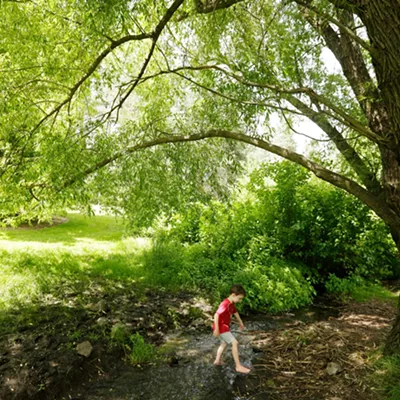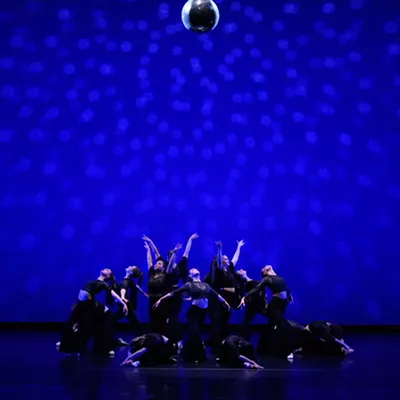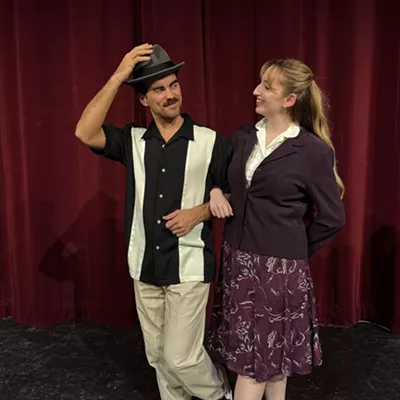
"My dear Mrs. Barrow," the letter began.
"It has come to my notice that perhaps, without intruding, you would like an expression of my impressions of your daughter, Eleanor Barrow, in recital at Bethel Church, the sixteenth."
The sender was Raymond Wheeler, director of Wheeler Music Studios in Portland, Seattle and Vancouver, B.C. On June 16, 1939, Wheeler had listened to Eleanor Barrow give a voice recital at the Bethel African Methodist Episcopal Church at the base of the South Hill in Spokane. He was impressed. So impressed, he thought that 20-year-old Eleanor could go pro. So he wrote to her mother — in a letter preserved along with scrapbooks and photographs at the Joel E. Ferris Archives at the Northwest Museum of Arts and Culture — hoping to assuage whatever concern she might have about her daughter pursuing an untraditional line of work:
"The art of making money in a career is not so far removed from the art of making money in any other honorable manner."
For Eleanor, a young Black woman who had spent her whole life in Eastern Washington, this might have been her ticket out. In her room, Eleanor kept a signed photo from Roland Hayes, one of the first Black tenors to be a classical concert performer, and an autographed program from Marian Anderson, a renowned Black contralto who made history with her rendition of "America (My Country, 'Tis of Thee)" at the Lincoln Memorial just two months before Eleanor's recital at Bethel AME. Wheeler offered this young artist the chance to chase her dreams of joining Hayes and Anderson on the world stage.
But this isn't a story about chasing fame or fortune. Eleanor didn't leave Spokane. There's no record of how Mrs. Barrow responded, but Eleanor said later that it was her choice to stay. Not only did she decide to stay in a city that didn't offer her many opportunities, but she gave everything she had to create those opportunities for the next generation in Spokane.
The daughter of one of the first Black pioneer families in Eastern Washington, Eleanor was steeped in the values of community, optimism and service. Though Eleanor never stopped singing locally, she became a career social worker instead, serving as an infant adoption advocate and a juvenile court officer. Over her lifetime, Eleanor volunteered for at least 32 charitable organizations in Spokane and was awarded nine community service awards. She was appointed trustee for both Whitworth University and Eastern Washington University. In 1942, she married Jim Chase, and together they went on to be the first and only Black mayor and first lady of Spokane.
And yet, for all her work, most people today don't recognize her name. Waiting in the MAC archives are plenty of collections that tell the histories, especially women's histories, illuminating where Spokane came from and what the city could grow to be. Some curiosity and a few hours are all it takes to rediscover Eleanor Chase, one of Spokane's most influential women.
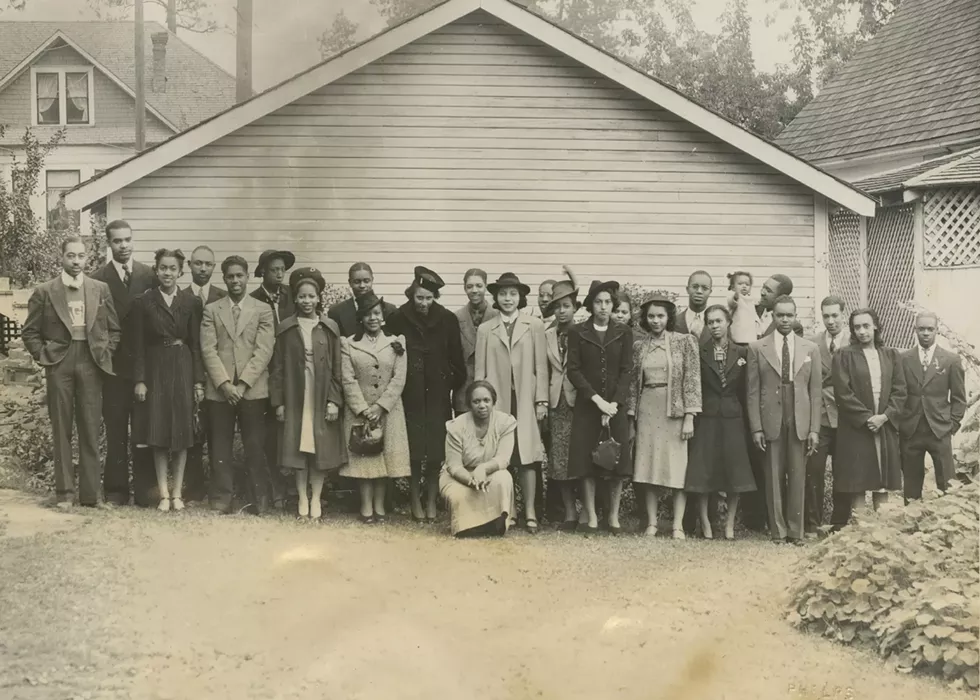
ELY-BONES
When Eleanor told her life story, she always began two generations before she was born. Her grandfather, Peter Barnabus Barrow, was born a slave in 1840 in Petersburg, Virginia. He fled slavery and joined the Union Army, marching in General Sherman's March to the Sea. After the war, he settled in Vicksburg, Mississippi, and represented Warren County in the state Legislature in 1870, after the 1868 Mississippi Constitution empowered Black men to vote and hold office.
Barrow had served two terms when Fred Wilson, a friend from Louisiana, wrote to "warn him about Reconstruction Days," as Eleanor put it in her notes. Wilson had moved to Deer Lake in Stevens County in 1888. He encouraged Barrow to do the same.
Soon, Barrow, his wife, Julia, and their seven children joined a wagon train west. They arrived in Eastern Washington shortly after the Great Fire in 1889, as Spokane began to rebuild over 30 city blocks that burned to the ground in one catastrophic evening.
In 1890, Barrow built a new house on East Second Avenue. He committed himself to the fledgling Black community by helping found Calvary Baptist Church, the first Black church in Spokane and the oldest Black congregation in the state. He also cultivated 140 acres of apple orchards in Deer Lake. When he died in a streetcar accident during a trip to Seattle in 1905, his legacy continued through his son Peter Jr. and the Deer Lake Irrigated Orchards Co. The orchards eventually employed over 100 African Americans and allowed anyone to invest in its stock.
Another son, Charles, got his first job as a printer for the Spokesman-Review. After some years, he decided to found his own paper, The Citizen, to focus on the concerns of the Black population in the city, which ran from 1908 to 1913.
When the paper closed, Charles married Olive Carr, the daughter of a Black pioneer family from Idaho. One year later, in the house that Peter Barrow built, Olive gave birth to a little boy named Kirk, and three years later, a spunky, energetic little girl named Eleanor.
Eleanor remembered an idyllic childhood, split between a big porch in Spokane and a big family resort in Deer Lake run by Uncle Peter. She ate fresh corn and strawberries from the orchards, and fresh cinnamon rolls from her mother's oven.
"I remember our home was kind of a meeting place for all the young people," she said in an interview with the Eastern Washington State Historical Society oral history committee. "The boys would come down and say, 'Mrs. Barrow, do you have any cinnamon rolls?' They knew she had them, and so they just loved to come by our house on the way home."
(Eleanor's childhood home near Helena Street was torn down to build Interstate 90. The home that Peter Barrow built, where Eleanor was born, was demolished more recently in anticipation of the north-south freeway.)
Most of the kids her age were boys, and with an older brother, Eleanor was a natural tomboy. She was so gangly that her friends called her "Ely-bones."
"I was strong, wiry and fearless, so I could join them with complete acceptance," she said.
In between swimming, climbing trees, running track and fishing, Eleanor started playing the piano by ear. When she was 11, she took a year of formal lessons. Twelve months was all it took for her to start playing dances for the kids who stopped by after school.
"Those were happy times, and I never feared anything," Eleanor said.
She was track champion, newspaper editor and valedictorian at Libby Junior High School. When she attended Lewis and Clark High School, music teacher George Stout noted her vocal talent and asked her to solo with the orchestra. She made it into news coverage often as a musician and a student, since she went to high school during the years when the highest grade point averages were published in the paper. Someone, presumably Eleanor or her mother Olive, clipped out every mention, underlined Eleanor's name and taped them onto stiff cardstock to make a scrapbook.
Her mother expected Eleanor to get the best grades she could, often excusing her from household chores if she needed more time to study. Olive checked coats at the Davenport Hotel, and Eleanor credits her for being the first social worker in the family.
"She loved it because she was right out there with people," Eleanor said. "She just spent time with anybody, and I think she probably hushed a lot of people that might have a little bit of prejudice in them. It didn't last too long with Mother."
Olive was an educator at heart. Eleanor remembered her mother insisting she and her brother "got our lessons — or else." Teachers ended up being some of the most important people in Eleanor's life — in her scrapbooks, she also saved newspaper clippings of her most beloved teachers at Libby and Lewis and Clark.
"My teachers gave me as much help as was given any other student," Eleanor said when she won an award from Spokane's Optimist Club in her adult years. "We had a wonderful rapport."
When Eleanor was 15, a railcar swung into town with three men from El Paso, Texas. Harry Blackwell, Elmo Dalbert and James Chase had finished a stint with the Civilian Conservation Corps and hopped some trains north to find new opportunities. James was 19 and had won a good amount of money by gambling on the train.
Spokane's Black community was small, fewer than 1,000 people in the 1930s and '40s. Eleanor and James Chase, or just "Chase," as everyone called him, couldn't help but get to know each other. He worked at the Davenport's barbershop, across First Avenue from the original downtown YWCA location, where Eleanor accompanied dance classes. They began to "eye each other," as Eleanor put it. When Eleanor went to Washington State College for her first year of college, Chase was the one who drove her and her mother to Pullman.
The Barrows helped Eleanor pay for college, and she worked as a piano accompanist to earn extra money, but tuition was still too expensive. Eleanor was homesick for Spokane, and maybe for Jim, too. He and her mother drove back to Pullman to pack her up after her freshman year. She had decided to transfer to Whitworth College instead.
At Whitworth, Eleanor thrived. She studied music and started giving concerts at local benefits and churches. She won awards in voice competitions while also accompanying other students on the piano for their performances. She traveled with Dr. Frank Furniss Warren, the new president of Whitworth, to advertise the university at Presbyterian churches around the state. Chase, who she said was "kind of a mascot at Whitworth, too" would tag along.
"That's one thing about Chase," Eleanor said. "We were inseparable when we started going together."
Raymond Wheeler of Wheeler Music Studios heard her sing during her time at Whitworth. Almost certainly, there were other interested agents and letters to her mother, though other letters weren't saved. But as soon as she graduated, Eleanor married Chase and decided she didn't want to spend any more time on the road. In 1943, the newlyweds had their first and only son, Roland, and Eleanor sent the agents away, choosing to stay home with her child instead.
Perhaps Eleanor did what was expected of her. After all, Chase had told her he wanted to marry her by saying "These are the hands I want to make my biscuits," a phrase few women would appreciate today. But it's hard to go through Eleanor's collection and feel anything but passion for her life in Spokane. She repeats again and again how much she loved the city. There's no record of her ever regretting her decision, even though her early years were certainly not as rosy as she chose to remember them.
"Those were happy times, and I never feared anything."
'YOU BE READY'
In the first half of the 20th century, the Black population grew slowly. Most Black men were only hired for menial labor or construction work, and Black women for low-paying domestic work. In Jerrelene Williamson's book African Americans in Spokane, early Black pioneer Clarence Freeman said that most foundations in downtown Spokane were laid by Black masons from Virginia, many of whom were his relatives. Almost all of Eleanor's uncles were servers at the City Club, today known as the Spokane Club.
Chase worked in a barbershop during his early years in Spokane because it was one of the only places that would hire him. The only way up for young Black men was to start their own businesses, which Chase did with his friends Blackwell and Dalbert. He started a body and fender repair shop with Blackwell in 1940, helped fix jeeps at Geiger Field during World War II, then started another autobody shop with Dalbert in 1945.
While some discrimination was buried or hidden, other racism surfaced publicly. A man named S.S. Moore sued the Pantages Theater for making him sit in the balcony because he was Black. Jurors eventually found that he should be able to sit wherever he wanted, and they awarded him $200. But when the Harlem Globetrotters came to town in the 1940s, no one else would give them housing. The Davenport Hotel initially refused lodging to both Sammy Davis Jr. and Louis Armstrong.
While most of Eleanor's scrapbooks are stuffed with praise-filled newspaper articles and personal notes from peers and society clubs, tucked within them are hints of more painful experiences. A tiny typed note falls out from between two browned pages, sent from Eleanor's parents to a Rev. McQueen, wishing "to commend and heartily thank you personally for your stand in Eleanor's behalf in becoming a member of your choir. Our problems could be solved in this U.S. if there were more people like you and your congregation."
Olive and Charles Barrow were convinced that the future would be better, which might have been why Olive was so adamant about education.
"My mother used to say, 'What's impossible today will be possible tomorrow and you be ready,'" Eleanor remembered.
Eleanor must have felt pressure to make tomorrow possible. In May 1940, a friend sent a letter to Eleanor after she was honored in a Canadian voice competition: "I only wish you to know, Eleanor, that you are winning a victory not just for today but for your future. This unbiased rating of your ability I know means more to you than the overwhelming discouragements you have now risen above."
When pressed in an interview later in life, Eleanor eventually acknowledged racism in her childhood. But to her, it was all relative to the experience of her family and friends who had come from Mississippi, Virginia and Texas. She seemed to think that overlooking racism was the best way to overcome it.
"I think that coming out from the South, there was a great appreciation for Spokane, really," she said. "It was a different city in those days. I never heard any of them complain about anything. The thing about it is that, of course there was prejudice. Even when I went to school and all, there would be prejudice. But you don't pay any attention to it because just as many that are prejudiced, there are just as many that aren't."
HUGGY BEAR
For Eleanor, staying home with her son didn't preclude her from volunteering around the city.
"I belonged to so many organizations and had singing engagements that I would just hop on the bus with Roland and go," she told Spokane Woman magazine. "While I was singing before a group, I looked down and saw that I had milk running down the front of my blouse."
By 1954, when Roland was 11, Eleanor went back to work full time. She studied to be a social worker and took a job with the state for 16 years. She then worked for Spokane County as a juvenile court officer for nine years. She was responsible for recommending to the judge whether a child should be taken away from their family or not. She later admitted that worry often kept her up at night, though she wouldn't tell her husband so he wouldn't ask her to stop. She worked predominantly with welfare clients, whom she always stood up for.
"Sure, I went into a lot of homes where I wondered if I would be able to get this mother squared away so she would know what she should be doing to care for her kids," she told the magazine. "But I can honestly say, I never met a family I didn't like."
She started a new social work service, called the Homemaker's Service, for families in the now defunct Aid to Dependent Children federal assistance program. Older women would go into homes of younger mothers and help teach cooking and caretaking skills, acting like aunts and grandmothers where no other family structure was present. The service was expensive and only lasted a few years before the state cut funding, but Eleanor said it was one of her proudest achievements.
"You've got to be able to accept that mother and go with her," she said later in life. "A lot of times, people give up on people with problems. You should never do that. I think they can tell if you care. You've got to care."
The Chases became modest celebrities in their East Central community. They helped organize fried chicken dinners to raise money to send low-income kids to summer camp. One of the kids who got to go thanks to the fried chicken funds was Betsy Wilkerson, who was elected Spokane City Council president earlier this month, the first Black woman to ever win a citywide election.
"To me, they were bigger than life," says Wilkerson, who grew up in East Central. "I had never been exposed to Black leadership like that."
Eleanor and her husband built their lives around their values. Chase was president of the NAACP for 17 years and shifted the chapter's focus toward employment opportunities for Black youth. He encouraged them to notify the Washington State Board Against Discrimination if they faced unfair employment challenges.
Chase first ran for City Council in 1969 but didn't win an election until 1975. He was then reelected in 1979 with three-quarters of the vote, even though Spokane's Black population was below 2% of the city. Then, Larry Karlson, a friend and fellow educator, stopped into his body and fender shop.
"He said to my husband, 'You are going to run for office,'" Eleanor said. "Chase's mouth just fell open. It was Larry Karlson that is the one that spearheaded him into office."
By "office," Karlson meant the mayoral office. Chase decided to give it a try and started campaigning for mayor of Spokane. Eleanor was there for every step. Together with Karlson and his wife, Ruth, they organized informal "coffee hours" for Chase to chat with constituents.
Chase was campaigning against Wayne Guthrie, a council member and city developer who was involved in the racist redlining of Spokane neighborhoods, a federally approved discriminatory tactic that limited where Black families could buy homes. Chase won handily — after election night, the Spokane Chronicle reported that Chase earned 60% of the vote, while an article in Ebony a few years later reported that Chase earned as much as 72% of the vote. Either way, the man nicknamed "Huggy Bear" had become not only the first Black mayor in Spokane, but the first Black mayor in the state of Washington.
As Jim's involvement in city politics grew, so did Eleanor's. In addition to being a soloist at the Westminster Congregational Church, a board member for two universities, a member of many advisory boards including the Sports, Events, Arts and Convention Advisory Board, the Friends of Riverfront Park, the Spokane Girl Scouts Council, and the Spokane YWCA, Eleanor attended every single City Council meeting.
"I wanted him to have someone to whom he could talk," she explained. "It wasn't important that he have a great big supper when he would get home [at] about 10 or 11 o'clock. No, it was important that we could go by Gung Ho Restaurant and discuss the issues."
The two remained inseparable throughout Chase's entire career, much to the delight of the press and fellow politicians. Once, when Eleanor stood up in a council meeting to speak on behalf of the American Cancer Crusade, her husband cut her off, asking her to fill out a white card just as every other citizen was required to. Then-Council member Vicki McNeill called to waive the rule, the mayor was overridden 6-1, and Eleanor was allowed to speak. The incident was reported in multiple newspapers the next day.
Eleanor and Chase always said on record that they never faced prejudice in Spokane. To them, promoting tolerance and freedom of speech even meant allowing the Aryan Nation to gather peacefully in Riverfront Park in 1983, which earned criticism from Carl Maxey and other civil activists. "That park is open to anyone and everyone, with no discrimination," Chase had told Spokane City Council Administrator Mary Franklin. Chase attended the rally, with heavy police protection.
Wherever Chase was, Eleanor was, too — in meeting rooms, in photos, on trips across the world and at interviews in City Hall. She spoke highly of her husband's mind and ability to speak without notes, though she mentioned that her "mouth would fly open" if she had something to say.
"I think each partner has to have a deep respect for their spouse," Eleanor told the Spokesman-Review. "You have to be able to look up to them."
A STRANGE NEW LAND
Although they loved their work and were loved by many in return, Chase didn't run for reelection in 1985. Battling cancer began to take its toll, and two years after he ended his term as mayor, Chase died. He was 73 years old. Over 1,200 people attended his funeral.
Eleanor continued to attend City Council meetings and kept up her civic engagement for as long as she could. The same year Chase died, Eleanor helped guide EWU into the Big Sky football conference. She continued trying to improve Spokane for the future, and no one was left out, not even her best friends, the Dalberts, who got a letter from Eleanor in 1988, as a bond to fund law enforcement was on the ballot:
"Dear Alta and Elmo, How are you? I hope and pray all goes well with you. I am writing to urge you to vote on September 20th...I am sure we are aware that there are youths with beliefs like those of the Ku Klux Klan and others in the Hayden Lake area that can make us fear for our safety...Therefore, let us vote on September 20th to protect our citizenry by giving our law enforcement agencies the tools which they need to do their work."
But Dalbert said after Eleanor's death in 2002 that the widow never truly recovered from losing Chase. The couple had been together almost constantly for almost 50 years. One of the most personal records in her archival collection is a letter she wrote to Chase after his death, and a poem she wrote to reckon with losing him, which she titled "Teach Me To Walk Alone."
I live in a strange new land
Where I must walk alone
Where I must smile without a tear
And grief must make no moan
My comfort and my guiding star
My tower of strength has gone
No peace descends to me at dusk
No light breaks with my dawn
Eleanor began to suffer from Alzheimer's. As her memory faded and she receded from public life, so, too, did memory of her life and legacy recede from view. TIME magazine misreported that Norm Rice in Seattle was the first Black mayor ever elected in the Northwest. They wouldn't print a correction, despite letters and a photograph from Eleanor.
The devoted wife, community advocate and cherished singer died May 31, 2002. The sole honor preserving Eleanor's name in Spokane is the Eleanor Chase House Reentry Center on the South Hill, a minimum security state Department of Corrections facility that prepares women to reenter society as they near the end of incarceration. The Department of Corrections felt "her work as a civic leader, her community involvement, her devotion to helping others and involvement in corrections issues were qualities we could honor by selecting her name."
"We actually have a picture of Eleanor Chase and an article about her framed so everyone that comes here [and] the women that stay here know about Eleanor Chase and a little bit about her legacy," says Michele Mans, the center manager.
The Chase name lives on in a few other places around Spokane: Chase Middle School, the Chase Youth Commission and the Chase Gallery in Spokane City Hall are named for her family. Decades ago, former Gov. Booth Gardner named Dec.12 "Jim Chase Day."
But when Betsy Wilkerson, herself a Libby Junior High alum, became an elected official, she learned more about the Chase family than she had ever known as a community member.
"When I became elected and got to really experience his legacy and their legacy together, I was even more impressed," she says. "What [Eleanor] did at Eastern and her music and everything else, what I read about her about a year ago, I didn't know half that stuff about Eleanor. It's like it was just buried and not celebrated." ♦

